

Media law may spell end to censorship. Burma is poised to adopt a new media law that could sweep away half a century of heavy-handed censorship, as an increasingly impatient press cautiously test the boundaries of newly-won freedoms.
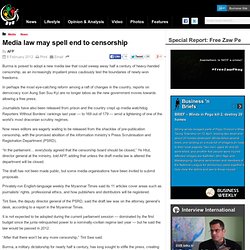
In perhaps the most eye-catching reform among a raft of changes in the country, reports on democracy icon Aung San Suu Kyi are no longer taboo as the new government moves towards allowing a free press. Journalists have also been released from prison and the country crept up media watchdog Reporters Without Borders’ rankings last year — to 169 out of 179 — amid a lightening of one of the world’s most draconian scrutiny regimes.
Now news editors are eagerly waiting to be released from the shackles of pre-publication censorship, with the promised abolition of the information ministry’s Press Scrutinisation and Registration Department (PSRD). The draft has not been made public, but some media organisations have been invited to submit proposals. Japan looks for friends in Naypyidaw. Burmese Foreign Minister Maung Lwin will travel to Tokyo later this month for bilateral meetings with the Japanese government, with business likely to feature high on the agenda as Japan looks to rekindle historically uneasy relations with Naypyidaw. The announcement of the 20 to 22 October visit coincides with a report in domestic press in Burma that Rangoon’s Sedona Hotel will play host to a Japan-ASEAN economic forum from 2 to 4 November.
Last month ASEAN Secretary General Surin Pitsuwan described greater ASEAN-Japan trade as “a win-win formula.” Japan’s largest business association, Keidanren, also visited Burma last month. The country has reinvigorated its efforts to engage with Burma after years of reticence following the detention of Aung San Suu Kyi in 2003, which induced the country to block all aid except disaster relief. This policy officially ended this year. Japan has several reasons to reassess ties with Burma. Burma Releases Dozens of Political Prisoners. Burma has released nearly 200 political prisoners as part of a general amnesty, including a few prominent activists.
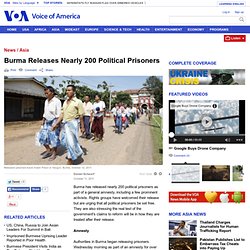
Rights groups have welcomed their release but are urging that all political prisoners be set free. They are also stressing the real test of the government's claims to reform will be in how they are treated after their release. Amnesty Authorities in Burma began releasing prisoners Wednesday morning as part of an amnesty for over 6,000 inmates. Burmese comedian and dissident Thura, known by his stage name Zarganar, was among those set free. He says he feels as if he was captured and held hostage by Somalia pirates. Charges Zarganar was arrested in 2008 and sentenced to 59 years in prison for criticizing the military government’s slow response to Cyclone Nargis. The deadly storm left 138,000 people dead or missing when it struck the Irrawaddy delta and hundreds of thousands homeless.
Political prisoners. Car swap scheme looks to cut pollution. The Burmese government has kick-started a scheme to swap old cars for a permit to import a new one, in what it claims to be an attempt to promote fuel efficiency and reduce emissions in the country.
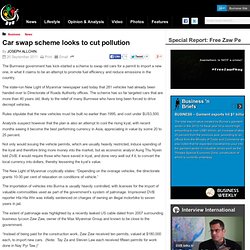
The state-run New Light of Myanmar newspaper said today that 281 vehicles had already been handed over to Directorate of Roads Authority offices. The scheme has so far targeted cars that are more than 40 years old, likely to the relief of many Burmese who have long been forced to drive decrepit vehicles. Rules stipulate that the new vehicles must be built no earlier than 1995, and cost under $US3,500. Zaw Oo: ‘Difficult road to economic reform’ Zaw Oo is a longtime commentator on Burma and is Director of Community Development and Civic Empowerment Program at Chiang Mai University, Thailand.
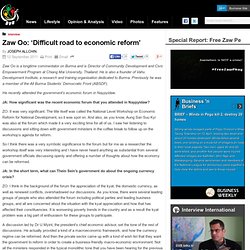
He is also a founder of Vahu Development Institute, a research and training organisation dedicated to Burma. Previously he was a member of the All Burma Students’ Democratic Front (ABSDF). He recently attended the government’s economic forum in Naypyidaw. JA: How significant was the recent economic forum that you attended in Naypyidaw?
ZO: It was very significant. So I think there was a very symbolic significance to the forum but for me as a researcher the workshop itself was very interesting and I have never heard anything as substantial from several government officials discussing openly and offering a number of thoughts about how the economy can be reformed. JA: In the short term, what can Thein Sein’s government do about the ongoing currency crisis? JA: What will reducing the interest rate do for the currency? ZO: Yeah, it worries me. Bangladesh ‘feared naval attack’ from Burma. Bangladeshi officials have said they expect a result in the arbitration over maritime boundaries in the Bay of Bengal by April, as a leaked US cable reveals that Dhaka was seeking US assistance after a Burmese military build-up stemming from the dispute.
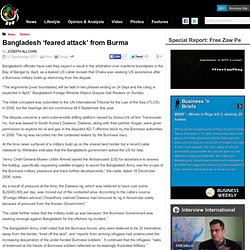
“The arguments [over boundaries] will be held in two phases ending on 24 Sept and the ruling is expected in April,” Bangladeshi Foreign Minister Mijarul Quayes told Reuters on Sunday. The initial complaint was submitted to the UN International Tribunal for the Law of the Sea (ITLOS) in 2009, but the hearings did not commence till 5 September this year.
The dispute concerns a semi-submersible drilling platform owned by Swiss-US oil firm Transocean Inc, but was leased to South Korea’s Daewoo. Daewoo, along with their partner, Kogas, were given permission to explore for oil and gas in the disputed AD-7 offshore block by the Burmese authorities in 2008.